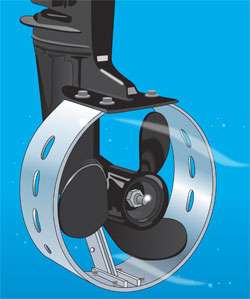

A propeller is the most important part of the ship. The propeller is submerged under the water and has blades or wings like a fan, propelling the ship in the water. Since the propeller is under the surface of the water, it can happen that rocks and underwater reefs can damage the blades of the propeller. In order to avoid such damage, a propeller guard needs to be installed.
A propeller guard, or a prop guard, as it is more commonly known, consists of a steel cage surrounding the propeller. The prop guard freely allows the movement of the propeller and safeguards it against rough underwater parts.


It is made of steel which makes it water-resistant and prevents rusting in the salty waters of the ocean. Apart from rocks and reefs, prop guards also offer protection to people who might come in contact with the propellers while doing snorkelling and underwater swimming. Prop guards also protect marine animals who could lose their lives by colliding against the fast-moving propellers.
The price of an ideal prop guard is around the US $ 200. There are different varieties of prop guards, which differ according to the size of the propeller and the choice of the propeller guard that a shipowner wants. They come in sizes that vary anywhere between 7 to 12 inches.
The two main types of propeller guards can be explained as follows:
Type I: This type of prop guard has a steel covering shaped like a mesh (net). This is the more preferred type of propeller guard as the mesh acts as a cage and protects the propeller from all sorts of possible damage. They provide all-around protection and usually increase drag because of their caged nature. As a result, they are often retractable. A well-known manufacturer of cage-type propellers is Adventure Marine.
Type II: This prop guard has a steel covering with large bands or gaps. This propeller guard is preferred less than the previously mentioned variety as it does not offer complete protection to the propeller.
In simple words, they are not as safe as caged-type propellers. Some of the propeller guards that fall under this type include ring or shroud guards, vane guards and deflectors.
A prop guard can be fitted very easily with the help of tools like a wench and a drill. Once fitted with a prop guard, a ship owner and the crew can rest assured that there will not be any extra costs incurred to replace the propellers continuously.
Propeller guards are usually made of stainless steel with various coatings, usually of nylon. However, they are often made of polypropylene and are much cheaper when compared to their stainless steel counterparts. Though Aluminium is lighter, it is not used because it is easily corroded. In the future, propeller guards are expected to be made of carbon fibre lighter than steel while retaining the same tensile strength.
Prop guard installation considers many accounts like the type of vessel it is used for, the area of operation of the vessel as well as the circumstances it is most likely to face. An example could be seen in a rescue boat. A rescue boat is usually operated in an area where people are mostly swimming. So they need to be fitted with a prop guard to account for the safety of those people. Another example could be seen in inshore rescue vessels used during rescue operations after a flood. Prop guards are needed so that rocks, grass, or any other large object in the water does not damage the propeller’s blades, thereby preventing the rescue operation.
Propeller guards are mainly used to protect people from getting hurt by the high-speed propeller or simply protect the propeller blades from rocks that can bend or break them. As time has progressed, propeller guards have developed.
Some advantages of propeller guards-
Like its many advantages, propeller guards also have a few disadvantages that must be considered when installing one.
Some disadvantages of using propeller guards-
Propeller guards are often used on drones. They protect the fragile parts of the drone while providing the full scope of movement. But they come at the cost of increased weight and cost.
Ultimately the person in charge of the vessel has to consider all the factors while installing the propeller. A propeller guard must be installed only after considering the engine and after a full assessment of the vessel: the vessel’s purpose and the experience of the person operating are the determining factors.










We believe that knowledge is power, and we’re committed to empowering our readers with the information and resources they need to succeed in the merchant navy industry.
Whether you’re looking for advice on career planning, news and analysis, or just want to connect with other aspiring merchant navy applicants, The Marine Learners is the place to be.